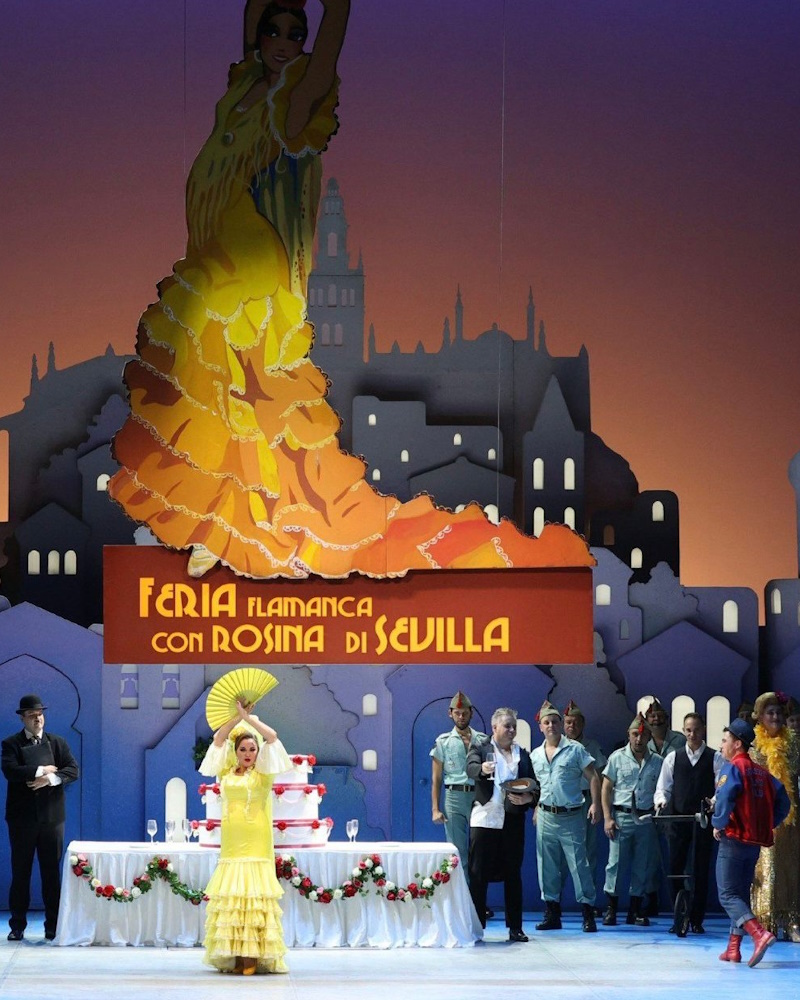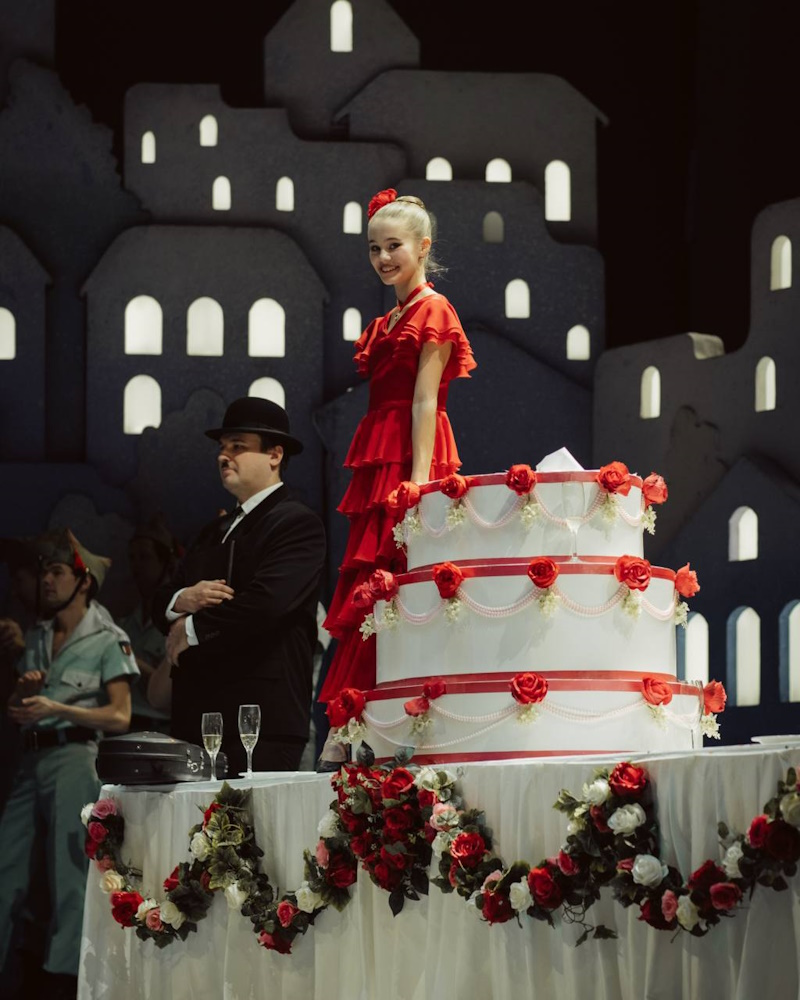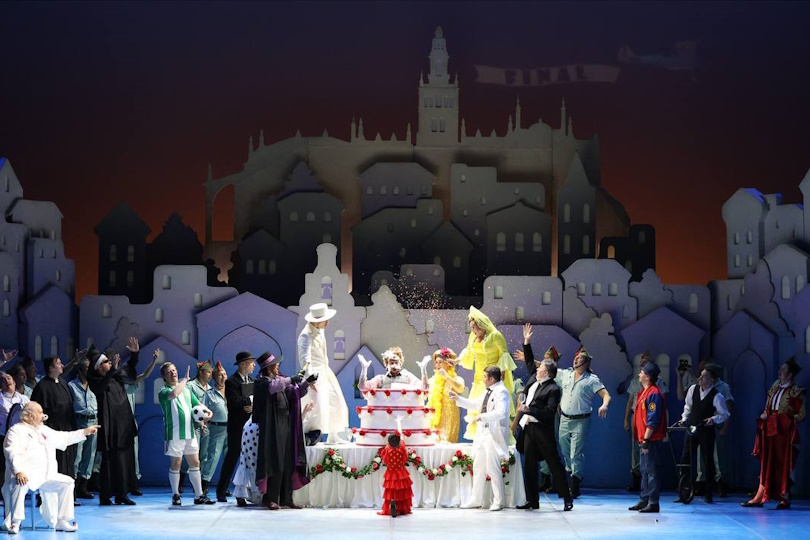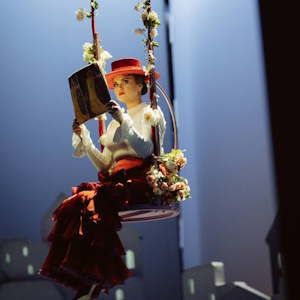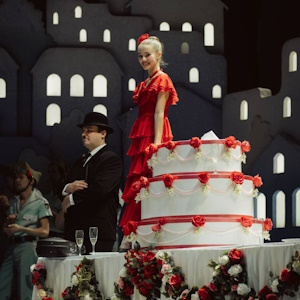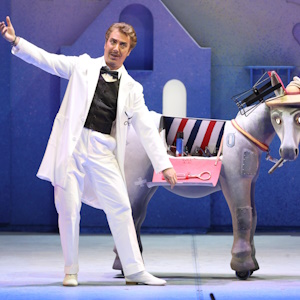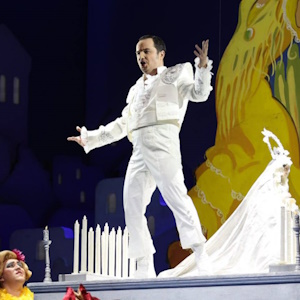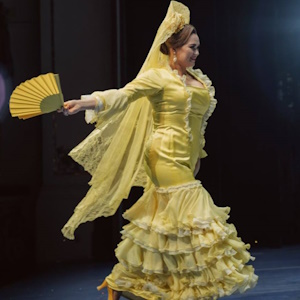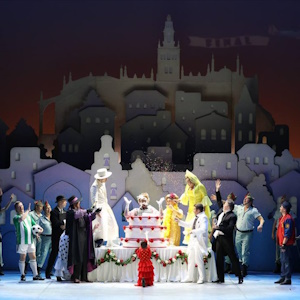Il barbiere di Siviglia
opera buffa in two acts
music by Gioachino Rossini
 performed in Italian (with Russian surtitles)
performed in Italian (with Russian surtitles)
One of the most popular operas in the world whose joyous melodies are instantly recognizable, it has been an indispensable fixture in the Mikhailovsky’s repertoire since 1918, when the Theatre’s own opera company was founded. Swiss director Éric Vigié has created his own unique production of this opera, harking back to a time when opera was not yet seen as the domain of the elites, but was designed to appeal to the most varied audiences. Colourful and heady, Seville is a true Southern city an incomparable microcosm of Spain as a whole. The crowd scenes are filled with footballers, pop stars, flamenco dancers, guitarists and even... a monkey, a donkey, and a ‘little blue dog’. This operatic scherzo — bright, elegant, and unfettered by the traditional canon — is guaranteed to leave audiences in the very best of spirits.
Act one
Seville. At dawn, Count Almaviva brings a band of musicians to serenade the beautiful Rosina, the ward of Dr Bartolo. When Rosina fails to answer his song, the count pays the players, and they leave. At the sound of Figaro’s voice, Almaviva steps away as the barber bounds in, boasting of his busy life as the neighbourhood factotum. Figaro, though currently in Bartolo’s employ, encounters Almaviva and promises him to help him win Rosina — for a suitable reward. At Figaro’s advice, Almaviva launches into a second serenade, calling himself Lindoro, a poor creature who can offer nothing but love. This time his serenade receives a response but somebody interrupts Rosina. The “allies” eavesdrop on Bartolo, who’s leaving the house to arrange his own marriage with Rosina. The old doctor thinks his ward to be such a nice medicine that should be prescribed only for him. There is no time to waste. One should steal a march on Bartolo. Figaro gets the money from Almaviva and promises to arrange a date with Rosina. Figaro doesn’t conceal that he’s drawn by the count’s money. Figaro suggests Almaviva disguise himself as a drunken soldier billeted to Bartolo’s house.
At Bartolo’s. The grumbling old man dogs his ward but nothing can impede Figaro to get in the house. Alone in the house, Rosina muses on the voice that has touched her heart and resolves to outwit Bartolo. Figaro joins her, but they leave on hearing footsteps. Bartolo enters with the music master, Don Basilio, who tells him Almaviva is a rival for Rosina’s hand and advises slandering the nobleman’s reputation by creating false rumours about him. Bartolo, however, decides to follow his own plan and invites Basilio to the study. Figaro overhears them. Warning Rosina that Bartolo plans to marry her himself the very next day, the barber promises to deliver a note she has written to “Lindoro”. Almaviva, disguised as a drunken soldier, arrives in search of lodging. Figaro dashes in to warn that their hubbub has attracted a crowd. Police arrive to silence the disturbance. As an officer is about to arrest him, Almaviva whispers his identity and is released. Bartolo is stupefied by everything that is happening.
Act two
Bartolo receives a young music teacher, “Don Alonso” (again Almaviva in disguise), who claims to be a substitute for the ailing Basilio. Initially, Bartolo is suspicious, but does allow Almaviva to enter when the Count gives him Rosina’s letter. Now the doctor is sure in Don Alonso’s assistance. Suddenly Basilio comes in, looking the picture of health. But everybody tries to assure him of his sickness, bribed by Almaviva, he feigns illness and departs. Rosina enters, recognizes her suitor and begins her singing lesson as Bartolo dozes in his chair. In order not to leave Alonso alone with Rosina, the doctor has Figaro shave him. The cunning barber makes soapsuds so that the doctor couldn’t see anything. Almaviva and Rosina plan their elopement that night but they are overheard by the doctor, who drives Figaro and Almaviva from the house and Rosina to her room, then sends again for Basilio. Bartolo dispatches Basilio for a notary, then tricks Rosina into believing “Lindoro” is really a flunky of Almaviva. After a thunderstorm, Almaviva arrives with Figaro and climbs through a balcony window to abduct Rosina. At first the girl rebuffs “Lindoro”, but when he explains that he and Almaviva are one and the same, she falls into his arms. Figaro urges haste, but before they can leave, their ladder is taken away. Basilio enters with the notary. Though summoned to wed Rosina and Bartolo, the official marries her instead to Almaviva, who bribes Basilio who has to choose between a ring and a bullet. Rushing in too late, Bartolo finds the lovers already wed. When Almaviva allows him to keep Rosina’s dowry, the old man accepts the situation.
Premiere of the production: 7 September 2017
Libretto by Cesare Sterbini after the comedy by Pierre-Augustin Caron de Beaumarchais
- Musical Director of the productionMikhail Tatarnikov
- Stage Director, Costume DesignerÉric Vigié
- Stage DesignerEmmanuelle Favre
- Lighting DesignerAlexander Kibitkin
- ChoreographerMaria Bolshakova
- Assistant to ConductorFilipp Selivanov
- Assistant to Stage DirectorYulia Prokhorova
- Assistant to Costume DesignerAlexandra Leonidova
- Chorus MastersAlexey Dmitriyev, Sergey Tsyplenkov
- Principal PianistsNatalia Dudik, Mark Vayner
- PianistIrina Dayneko
- Italian language ConsultantDaria Mitrofanova

